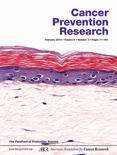
Cancer Prevention Research
Scope & Guideline
Unraveling cancer's mysteries, one study at a time.
Introduction
Aims and Scopes
- Biomarker Discovery and Application:
The journal emphasizes the identification and validation of biomarkers that can aid in the early detection of cancer and assess individual risk factors. This includes genetic, epigenetic, and proteomic markers. - Lifestyle and Dietary Interventions:
Research on the roles of diet, exercise, and lifestyle modifications in cancer prevention is a core focus, exploring how these factors influence cancer risk and progression. - Genetic and Environmental Risk Factors:
The journal investigates the interplay between genetic predispositions and environmental exposures in cancer development, aiming to enhance risk stratification and personalized prevention strategies. - Immunoprevention and Vaccination:
A significant area of research is dedicated to immunoprevention strategies, including the development of vaccines and immunotherapies aimed at preventing cancer progression in high-risk populations. - Community Engagement and Health Equity:
The journal places importance on community-based approaches and health equity, studying how socioeconomic factors and access to care impact cancer prevention efforts. - Clinical Trials and Translational Research:
Cancer Prevention Research publishes findings from clinical trials that evaluate the efficacy of preventive interventions, aiming to translate research into practical applications for cancer prevention.
Trending and Emerging
- Microbiome Research and Cancer:
The role of the microbiome in cancer development and prevention is increasingly recognized, with studies exploring how microbiota composition influences cancer risk and treatment responses. - Precision Cancer Prevention:
There is a growing emphasis on personalized prevention strategies, utilizing genomic and biomarker data to tailor interventions for individuals based on their unique risk profiles. - Health Disparities and Social Determinants:
Research addressing health disparities, particularly in underserved populations, is on the rise, focusing on how social determinants impact cancer risk and prevention efforts. - Integration of Artificial Intelligence in Cancer Prevention:
The use of AI and machine learning in analyzing large datasets for cancer risk prediction and prevention strategies is becoming more prevalent, indicating a trend toward data-driven approaches. - Inflammation and Cancer Prevention:
Emerging studies are increasingly focusing on the role of inflammation in cancer biology, investigating how anti-inflammatory strategies can be utilized for prevention.
Declining or Waning
- Traditional Chemoprevention Agents:
Research on conventional chemopreventive agents, like certain NSAIDs or antioxidants, has seen a decline, possibly due to the increasing focus on precision medicine and targeted therapies. - Single-Agent Studies:
There is a noticeable reduction in studies focusing on single-agent interventions, as the field shifts towards more complex, multifactorial approaches to prevention. - Basic Laboratory Studies Without Clinical Relevance:
The journal has moved away from publishing basic science studies that do not have direct implications for clinical practice or public health, favoring research that bridges the gap between laboratory findings and real-world applications. - Epidemiological Studies in Isolation:
While epidemiological studies remain important, there is a trend towards integrating these findings with molecular and clinical data, reducing the emphasis on standalone epidemiological research.
Similar Journals

Cancer Communications
Connecting Researchers, Practitioners, and Patients in OncologyCancer Communications, published by WILEY, is a leading open-access journal that has positioned itself at the forefront of cancer research and oncology since its inception in 2017. With an impressive HIndex reflective of its scholarly impact and recognized in the Q1 category for both Cancer Research and Oncology as of 2023, this journal consistently ranks in the top echelons of its field, specifically at Rank #16/404 and Rank #13/230 in their respective categories on Scopus. Cancer Communications aims to disseminate cutting-edge research findings, innovative methodologies, and significant advancements in cancer treatments, thereby fostering a deeper understanding of oncology among researchers, healthcare professionals, and students. The journal operates under an Open Access model since 2018, ensuring that vital research is accessible to a global audience, thus enhancing collaboration and knowledge sharing necessary to tackle one of the most pressing health challenges of our time. Located in Hoboken, NJ, United States, and with a strong commitment to scientific excellence, Cancer Communications remains an essential resource for anyone engaged in the fight against cancer.
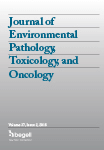
JOURNAL OF ENVIRONMENTAL PATHOLOGY TOXICOLOGY AND ONCOLOGY
Integrating Science to Address Health and Environmental IssuesJOURNAL OF ENVIRONMENTAL PATHOLOGY TOXICOLOGY AND ONCOLOGY, published by BEGELL HOUSE INC, serves as a vital platform for researchers and professionals engaged in the interdisciplinary fields of environmental health, pathology, and toxicology. With a history spanning from 1984 to the present, the journal is dedicated to disseminating high-quality research that explores the complexities of environmental threats to human health and their pathological implications. Its current ranking in the Q3 category across key areas including Health, Toxicology and Mutagenesis, Medicine (miscellaneous), and Pathology and Forensic Medicine underscores its relevance in the academic landscape. Despite not being an open-access journal, it remains an essential resource for those seeking to understand the impact of environmental factors on health outcomes. The journal's rigorous peer-review process and commitment to advancing knowledge make it an indispensable tool for students, researchers, and professionals striving to address pressing health and environmental challenges.
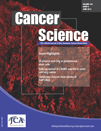
CANCER SCIENCE
Pioneering discoveries in cancer biochemistry and genetics.Cancer Science, an esteemed journal published by Wiley, stands at the forefront of oncology research, boasting an impressive impact factor and a classification in the Q1 category for its contributions in Cancer Research, Medicine, and Oncology as of 2023. Since its inception in 2003 and transitioning to an Open Access model in 2014, the journal has facilitated global dissemination of critical research findings, ensuring that vital information remains accessible to researchers, clinicians, and students alike. With its comprehensive scope covering cutting-edge discoveries in cancer biochemistry, genetics, and molecular biology, Cancer Science is recognized for its rigorous peer-review process and significant contributions to advancing our understanding of cancer. The journal, located at 111 River St, Hoboken, NJ, is an essential resource for anyone dedicated to improving treatment outcomes and pushing the boundaries of cancer research.

Journal of Cancer Prevention
Transforming Knowledge into Action Against Cancer.Journal of Cancer Prevention is a pivotal scholarly publication dedicated to advancing research and knowledge in the field of cancer prevention and control. Published by the Korean Society for Cancer Prevention, this journal serves as a platform for innovative studies that focus on strategies to mitigate cancer risk factors, enhance early detection, and improve public health policies. With an ISSN of 2288-3649 and E-ISSN of 2288-3657, the journal ensures wide accessibility to emerging evidential research, contributing significantly to the global discourse on cancer prevention. Though currently not an open-access journal, Journal of Cancer Prevention remains committed to disseminating high-quality research, emphasizing rigorous peer review processes and upholding scientific integrity. Researchers, healthcare professionals, and students alike are encouraged to engage with the journal’s contributions that aim to forge collaborative pathways towards effective cancer prevention strategies in diverse populations.
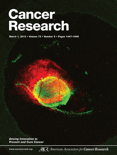
CANCER RESEARCH
Advancing the frontiers of oncology research.Cancer Research, published by the American Association for Cancer Research, is a premier journal in the field of oncology, renowned for its commitment to advancing cancer research since its inception in 1941. With an impressive impact factor reflecting its vital role in the field, this journal consistently ranks in the Q1 quartile for both Cancer Research and Oncology, positioning it among the top 7.5% of journals in these categories. The journal serves as a crucial platform for researchers, professionals, and students to disseminate and gain insights into groundbreaking studies that shape our understanding of cancer biology, prevention, diagnosis, and treatment. While it is not an open-access publication, its rigorous peer-review process ensures that only high-quality research is published, thus maintaining a standard of excellence in the scientific community. With a strong legacy and an ever-expanding influence, Cancer Research continues to be essential for anyone dedicated to the fight against cancer, showcasing cutting-edge research that drives scientific discovery and innovation.

Middle East Journal of Cancer
Connecting researchers to combat cancer globally.Middle East Journal of Cancer, with an ISSN of 2008-6709 and an E-ISSN of 2008-6687, is a prominent open-access journal published by Shiraz University of Medical Sciences since 2010. Based in Iran, the journal aims to advance the knowledge and understanding of cancer research and oncology through the dissemination of high-quality, peer-reviewed articles. With open access availability, it promotes global collaboration and accessibility in research, making findings readily available to a wider audience. The journal is categorized in Q4 for both Cancer Research and Oncology as of 2023, highlighting its emerging presence in these fields. Alongside its Scopus ranks, where it positions 319th out of 404 in Medicine - Oncology and 198th out of 230 in Biochemistry, Genetics and Molecular Biology - Cancer Research, it serves as a platform for researchers, professionals, and students to enrich their expertise and contribute to the evolving landscape of cancer studies. The journal's continuous commitment to quality and accessibility represents an essential resource for those dedicated to advancing cancer research and improving patient outcomes in the Middle East and beyond.

Cancer Research Communications
Elevating cancer research to new heights.Cancer Research Communications is an esteemed journal published by the American Association for Cancer Research, a leading organization in the field of oncology. This journal aims to advance knowledge in cancer research through the dissemination of high-quality, peer-reviewed articles that cover a wide range of topics related to cancer biology, treatment modalities, and prevention strategies. As an open-access journal, Cancer Research Communications ensures that vital research findings are accessible to a global audience, promoting collaboration and innovation within the scientific community. The journal serves as a crucial platform for researchers, professionals, and students to share their insights and foster the exchange of effective cancer therapies and methodologies. With a commitment to excellence, it plays a significant role in shaping the future of cancer research and therapeutic development.
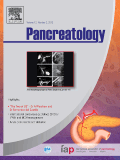
Pancreatology
Advancing the Frontiers of Pancreatic HealthPancreatology is a prestigious journal published by ELSEVIER, focusing on the multifaceted disciplines of endocrinology, diabetes, gastroenterology, and hepatology since its inception in 2001. With an impressive Q1 ranking in multiple categories, including Endocrinology and Gastroenterology, Pancreatology stands out as a critical platform for disseminating peer-reviewed research that contributes to the evolving understanding of pancreatic diseases and associated metabolic disorders. This journal has gained significant recognition in the academic community, underscored by its robust Scopus rankings, positioning it favorably among its peers. While it currently does not offer open access, Pancreatology remains committed to advancing knowledge through high-quality publications and fostering innovation in clinical practice and research. Researchers, professionals, and students are invited to engage with the cutting-edge findings within its pages, which are essential for driving progress in this essential area of medicine.
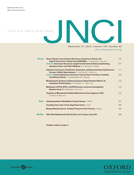
JNCI-Journal of the National Cancer Institute
Empowering oncologists with groundbreaking insights.JNCI-Journal of the National Cancer Institute, published by Oxford University Press Inc. in the United Kingdom, is a premier journal dedicated to advancing the field of cancer research and oncology. With a distinguished history dating back to 1940, this journal has consistently maintained a strong reputation within the academic community, achieving a remarkable Q1 ranking in both Cancer Research and Oncology as of 2023. Researchers and practitioners rely on the JNCI for original research articles, review papers, and cutting-edge findings that impact clinical practices and therapeutic strategies. Although it does not currently offer open access, the journal remains a vital resource for academicians and healthcare professionals seeking to enhance their understanding of cancer mechanisms and treatment innovations. Its rigorous peer-review process ensures the publication of high-quality, credible research that meets the evolving challenges of cancer treatment and prevention through to 2024.
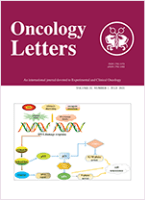
Oncology Letters
Empowering Oncology with Groundbreaking DiscoveriesOncology Letters is a prominent academic journal dedicated to disseminating high-quality research in the fields of oncology and cancer research. Published by SPANDIDOS PUBL LTD and based in Greece, this journal has established a significant presence since its inception in 2010 and continues to contribute to the scientific community with a focus on both clinical and experimental oncology. Notably, it holds a respectable Q3 ranking in the categories of Cancer Research and Oncology as of 2023, highlighting its relevance and contribution to these critical fields. With a Scopus rank of #139/404 in Medicine – Oncology and #117/230 in Biochemistry, Genetics, and Molecular Biology – Cancer Research, Oncology Letters serves as a valuable platform for researchers, professionals, and students alike to explore emerging findings and innovative treatment approaches. Though it operates within a traditional subscription model, this journal prides itself on fostering accessible and impactful discourse in oncology, making it an essential resource for those committed to advancing cancer research and improving patient care.